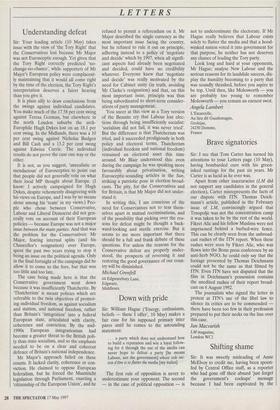LETTERS Understanding defeat
Sir: Your leading article (10 May) takes issue with the view of 'the Tory Right' that the Conservatives lost because Mr Major was not Eurosceptic enough. Yet given that the Tory Right correctly predicted 'no- change-no-chance', while supporters of Mr Major's European policy were complacent- ly maintaining that it would all come right by the time of the election, the Tory Right's interpretation deserves a fairer hearing than you give it.
It is plain silly to draw conclusions from the swings against individual candidates. You make much of the 17.58 per cent swing against Teresa Gorman, but elsewhere in the north London suburbs the arch- Europhile Hugh Dykes lost on an 18.1 per cent swing. In the Midlands, there was a 10 per cent swing against Nicholas Budgen and Bill Cash and a 13.2 per cent swing against Edwina Currie. The individual results do not prove the case one way or the other.
It is not, as you suggest, 'unrealistic or mendacious' of Eurosceptics to point out that people did not generally vote on what their local MP thought about Europe. (I know: I actively campaigned for Hugh Dykes, despite vehemently disagreeing with his views on Europe, and I was by no means alone among his 'team' in my views.) Peo- ple who chose between Conservative, Labour and Liberal Democrat did not gen- erally vote on account of their European policies — because Europe was not a major issue between the main parties. And that was the problem for the Conservatives: Mr Major, fearing internal splits (and his Chancellor's resignation) over Europe, spent the past two years trying to stop it being an issue on the political agenda. Only in the final fortnight of the campaign did he allow it to come to the fore, but that was too little and too late.
The case being made here is that the Conservative government went down because it was insufficiently Thatcherite. By `Thatcherism' is meant policies which are referable to the twin objectives of promot- ing individual freedom, as against socialism and statism, and national freedom, rather than Britain's 'integration' into a federal European state, articulated with clarity, coherence and conviction. By the mid- 1990s European integrationism had become a greater threat to the British poli- ty than state socialism, and so the emphasis needed to be on a clear and coherent defence of Britain's national independence.
Mr Major's approach failed on these counts. It lacked clarity, coherence or con- viction. He claimed to oppose European federalism, but he forced the Maastricht legislation through Parliament, enacting a `citizenship of the European Union', and he refused to permit a referendum on it. Mr Major described the single currency as the most important issue facing the country, but he refused to rule it out on principle, adhering instead to a policy of 'negotiate and decide' which by 1997, when all signifi- cant aspects had already been negotiated and decided, could have no credibility whatever. Everyone knew that 'negotiate and decide' was really motivated by the need for Cabinet unity (in truth, avoiding Mr Clarke's resignation) and that, on this most important issue, principle was thus being subordinated to short-term consider- ations of party management.
You sneer at this view as a Tory version of the Bennite cry that Labour lost elec- tions through being insufficiently socialist: `socialism did not fail, it was never tried'. But the difference is that Thatcherism was tried, and it succeeded prodigiously in both policy and electoral terms. Thatcherism (individual freedom and national freedom) remained an electoral asset this time around. Mr Blair understood this: even during the campaign he was speaking more favourably about privatisation, writing Eurosceptic-sounding articles in the Sun, striking a patriotic pose in election broad- casts. The pity, for the Conservatives and for Britain, is that Mr Major did not under- stand it.
In writing this, I am conscious of the need for Conservatives not to tear them- selves apart in mutual recriminations, and of the possibility that picking over the rea- sons for defeat might be thought a back- ward-looking and sterile exercise. But it seems to me more important that there should be a full and frank debate of these questions. For unless the reasons for the Conservative defeat are properly under- stood, the prospects of reversing it and restoring the good governance of our coun- try will be diminished.
Michael Grenfell
64 Edgwarebury Lane, Edgware, Middlesex


































































 Previous page
Previous page